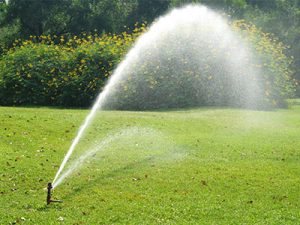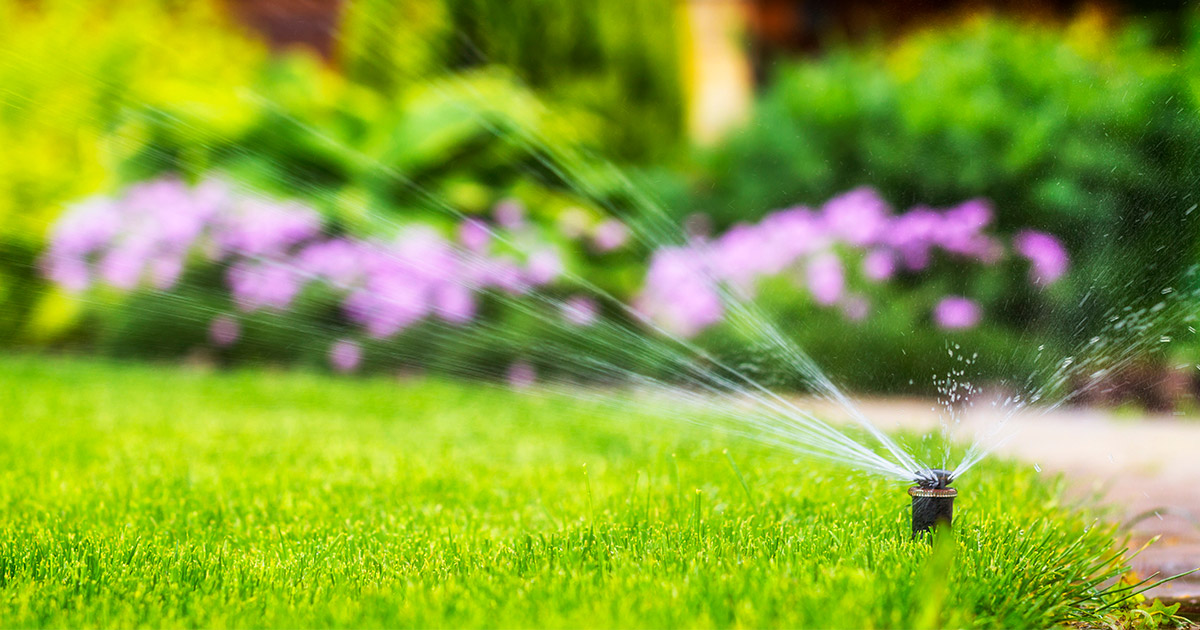While a dramatic “ice sculpture” from a burst irrigation system may be mesmerizing, it’s not something you want to experience in your own yard. In Florida, thankfully, hard freezes are relatively rare occurrences. But that’s no reason to eliminate irrigation winterization from your list of seasonal priorities. Knowing how to winterize a sprinkler system can save commercial property owners both time and dollars that can be better spent in other ways.
Actually, “The Old Farmers Almanac” predicts that this winter will be drier and milder than winters of the recent past, with our coldest temperatures not expected until mid-January through February. That should make us all happy, following the stormy past few months. It is still smart, however, to perform some basic sprinkler system maintenance before the cooler season arrives. Periodic checks of a sprinkler system’s operation will prolong its lifespan. Making recommended adjustments to compensate for seasonal variations will assure that your landscape is always maintained in prime condition.
Basics of Irrigation Winterization
 Winterizing your landscape’s irrigation system doesn’t necessarily mean shutting it down. Even though it’s winter on the calendar, the Florida landscape still boasts green grass and blooming plants that need care and grooming as well as water. But in northern Florida, particularly in the Panhandle, there can be prolonged cold spells where daytime temperatures drop into the 40s and dip even lower at night. Floridians may not often experience snow on the ground, but we all know the effects of frost on our citrus crops and delicate tropical blooms.
Winterizing your landscape’s irrigation system doesn’t necessarily mean shutting it down. Even though it’s winter on the calendar, the Florida landscape still boasts green grass and blooming plants that need care and grooming as well as water. But in northern Florida, particularly in the Panhandle, there can be prolonged cold spells where daytime temperatures drop into the 40s and dip even lower at night. Floridians may not often experience snow on the ground, but we all know the effects of frost on our citrus crops and delicate tropical blooms.
So it’s wise to have a plan. At ASI, we’re equally committed to water management and beautiful landscapes. Here’s what you should know about winter irrigation.
Check out our partnership with Weathermatic Water Management
Does Your System Have a Freeze Sensor?
If not, why not? Just as a rain sensor is an acknowledged asset during the wetter months for both efficient and cost-effective operation, a freeze sensor will automatically turn the system off when temperatures drop below 32 degrees, or any time moisture is detected. Any accumulated water — even a slight glaze on sidewalks or roadways — can be hazardous as well as wasteful. Built-up frost or ice will damage plants.
If you already have a sensor, now is the time to check it to assure that it’s functioning properly. Confirm that the batteries are in good condition, and perform a manual check with a blast of cold, compressed air to see if the light comes on. Battery life is affected by cold, so it’s not a bad idea to check sensor operation regularly.
Winterize Sprinkler System Components
Underground water lines are typically insulated and should be of little concern during a Florida winter. But, if a freeze occurs, surface lines and drip irrigation systems may be adversely affected, although it’s usually not an issue. Some owners cover exposed lines with insulating fabric prior to a freeze, or remove the lines from attached pumps and pump housings. Unless a prolonged freeze is expected, it’s rarely necessary to drain or blow out sprinkler lines.
Check Hose Bibs; Remove Hoses
Always disconnect hoses from a building’s hose bibs, or from an outdoor hydrant when the temperature dips. They’re easy enough to reattach when needed. Although modern spigots are equipped with freeze protectors, it’s better to be safe than sorry. Damage resulting from a leaking or burst bib can be extensive inside a building, and expensive to repair. Drain hoses as much as possible before storing them.
Watering in the Winter
When a rare freeze is expected, it can be beneficial to water beforehand. Most irrigation lines are placed deep enough to be unaffected by a short freeze, but tender grass and landscape plant roots can be damaged. Damp soil retains heat better than dry dirt, however, so watering just before a freeze will give your landscape an edge.
Determine Winter Landscape Maintenance Needs
Watering requirements vary in different parts of the state, based on the specifics of your landscape design. Take stock of your specific needs; reset irrigation clocks and patterns if necessary to adjust for seasonal needs. Winter may also be the right time to assess your overall landscape plan. It can be the ideal time to plan improvements to your landscape for added value and design interest.
Take advantage of your landscape’s seasonal growth cycles. During the winter season, plants get a bit of a break: Shorter daylight hours and slower growth cycles are beneficial in many ways. Install new hardscape features with minimum disruption to plant growth, clean up existing beds, transplant some species of trees and perennials, and begin planning for spring. With reduced watering schedules, winter is also the right time to modernize your irrigation system, add or replace sprinkler heads, change and modify valves, install interior controllers to a building, run additional lines or adapt a drip system to new uses. Most of Florida, of course, enjoys moderate temperatures and an outdoor lifestyle throughout the year, making both indoor and outdoor work feasible during the winter.
Trust a Professional to Know How to Winterize a Sprinkler System
In case you need to shut your irrigation system down for any reason, consider hiring a professional to do the work. Sprinkler system maintenance, particularly for extensive commercial landscapes, requires knowledge and expertise, something that characterizes all the services offered by ASI Landscape Management. With more than 20 years of experience, and offices in Tampa, Orlando, and Pinellas, we offer comprehensive services to commercial clients throughout Florida. We take pride in our people, our performance, and our completed projects. We always aim to exceed expectations.
We design and install beautiful landscapes, and we also provide irrigation systems to keep them looking their best throughout the year. We recognize that Florida weather can be challenging and unpredictable, but we’re ready and willing to respond to local needs.
If you have questions about the need for irrigation winterization in your region or want professional advice on a specific project, contact us to schedule a consultation. We’ll set your mind at ease and perform any work that’s required.


